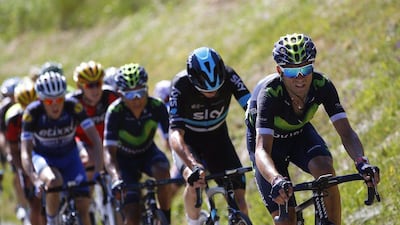The British were supposed to dominate the Olympic road race in London, ushering sprint ace Mark Cavendish over the lumpy course in the Surrey countryside and delivering him to the finish at Buckingham Palace.
Instead, Kazakh rider Alexander Vinokourov boldly broke away for gold.
Four years later, things could be even more unpredictable when riders line up at famed Copacabana Beach on the first full day of the Rio Olympics. The first medal event of the cycling program will feature one of the most challenging road courses in Olympic history, a hilly ride on the Brazilian coast that could whittle the field to a handful of riders by the time they reach the finish at Flamengo Park.
“It’s a really gnarly course,” said Jim Miller, the vice president of athletics for USA Cycling.
Just as gnarly is the time trial course, which uses a rolling portion of the road course, and at 36 miles for the men and nearly 20 for the women is long enough to tax even the most powerful riders.
“I think it’s maybe one of the hardest stand-alone time trials I’ve ever seen,” Miller said. “You are looking at an hour-long TT for the guys, and one that’s not at all straightforward.”
Indeed, the road races and time trials are complex events. Here is a breakdown of what you should know:
COURSES MATTER
Fast, flat courses favor sprinters, and the courses in Brazil are neither flat nor fast. They are more like a one-day race in Northern Europe, complete with cobbled sections and tough climbs. Riders such as Tour de France champion Chris Froome could have a chance to shine.
AMERICAN HOPES
There are only two American men in the event, Taylor Phinney and Brent Bookwalter. Phinney has medal aspirations – he was fourth in both races in London. The American women will arrive at the Rio Games as heavy favorites. Megan Guarnier is the top-ranked rider in the Women’s WorldTour and will be backed on the road by a strong cast of veterans, while Kristin Armstrong is the two-time and defending time trial champ.
“I feel prepared,” Armstrong said, “and am really looking forward to the challenging time trial course.”
NAMES TO WATCH
Alejandro Valverde and Joaquin Rodriquez of Spain, Vincenzo Nibali of Italy and Rui Costa of Portugal are some of the men with the skills suited for Rio’s road course. Reigning gold medalist Marianne Vos and fellow Dutchwoman Anna van der Breggen are among the headliners in the women’s field, while Britain’s Lizzie Armitstead will have to survive the tough climbs to have a shot.
In the time trial, Bradley Wiggins decided to compete on the track rather than defend his gold, so Tony Martin becomes the favorite with Dutch rider Tom Dumoulin and Australian star Rohan Dennis joining Froome in trying to dethrone the German powerhouse. In the women’s race, world champion Linda Villumsen of New Zealand, German star Lisa Brennauer and Ellen van Dijk of the Netherlands should contend.
“I have great memories of London and winning bronze in the time trial,” Froome said. “I will be giving it everything I can in Rio to try and win another medal for Great Britain.”
WHO IS MISSING
Vinokourov retired shortly after his road race triumph in London, while Cavendish joined Wiggins in switching back to the track. But the biggest name missing is world champ Peter Sagan, who decided to compete in mountain biking after deciding the road course was too tough for him.
“The aim is to achieve the best result,” said Slovak Cycling Federation executive Jan Zilovec. “Peter in the past managed to win the World Cup in mountain biking, so his chances of a good outcome are realistic.”
AVOIDING CONTROVERSY
Vinokourov put doping in the spotlight with his victory in London after his much-publicized history with performance-enhancing drugs. But perhaps getting more attention during the run-up to Rio has been mechanical doping, the use of tiny motors inside frames to give riders an edge. The sport’s world governing body, the UCI, has poured money and research into developing tablets and other devices to test for improper mechanics. Keeping the race controversy-free has never been more complex.
“It’s cheating, and people will always try,” UCI president Brian Cookson said. “But we’ll be working with the IOC, we’ll have delegates to the technical checks and we’ll work together to ensure a clean race.”
Follow us on Twitter @NatSportUAE
Like us on Facebook at facebook.com/TheNationalSport

